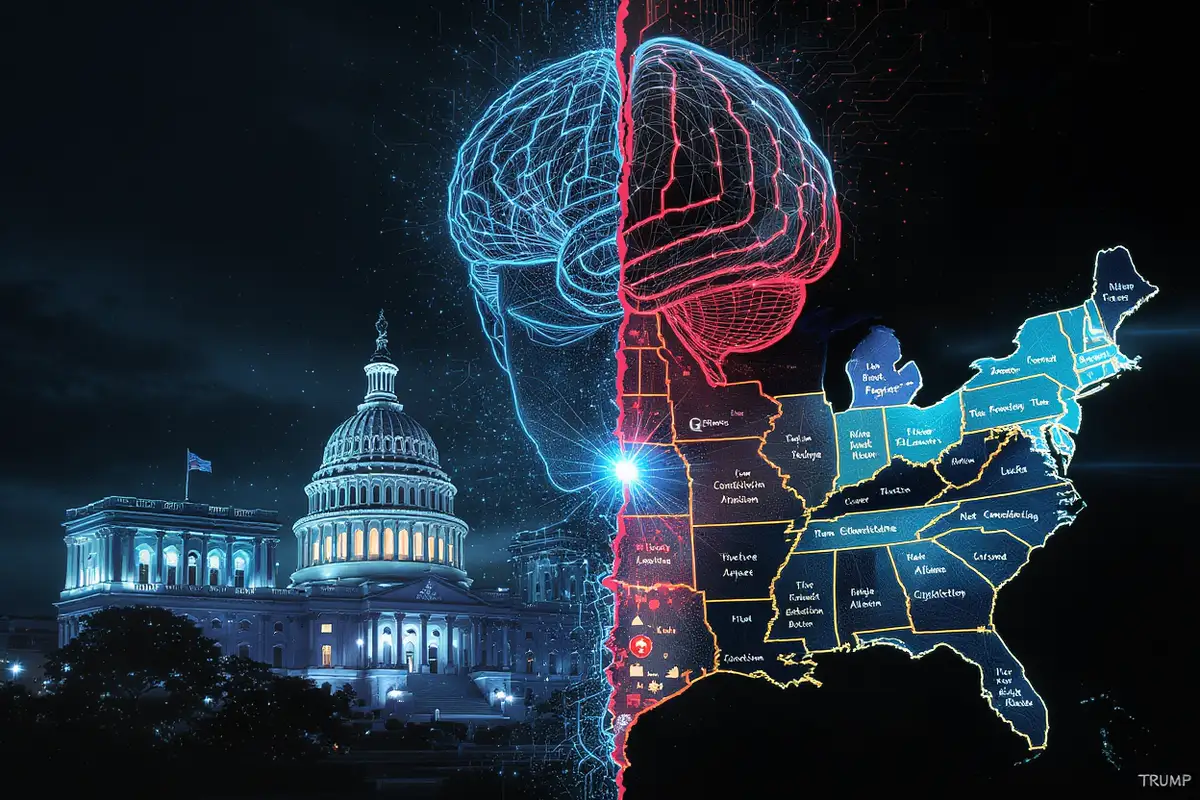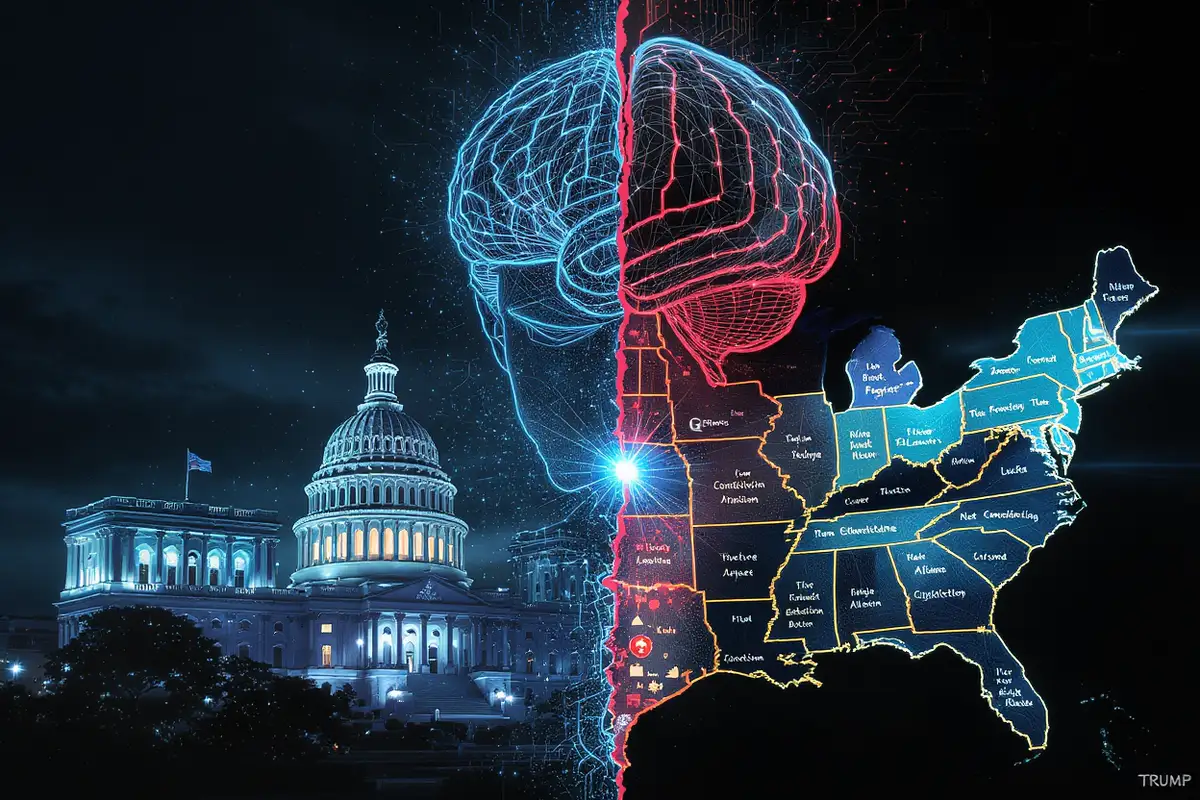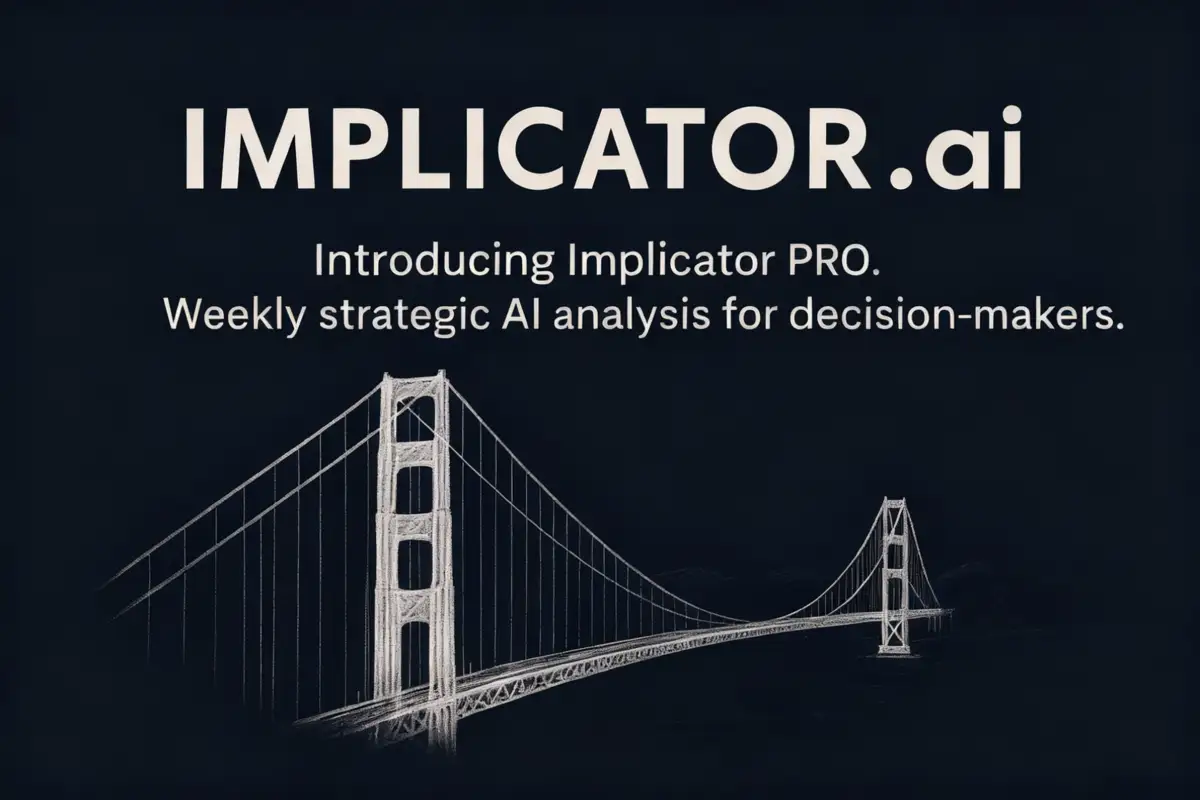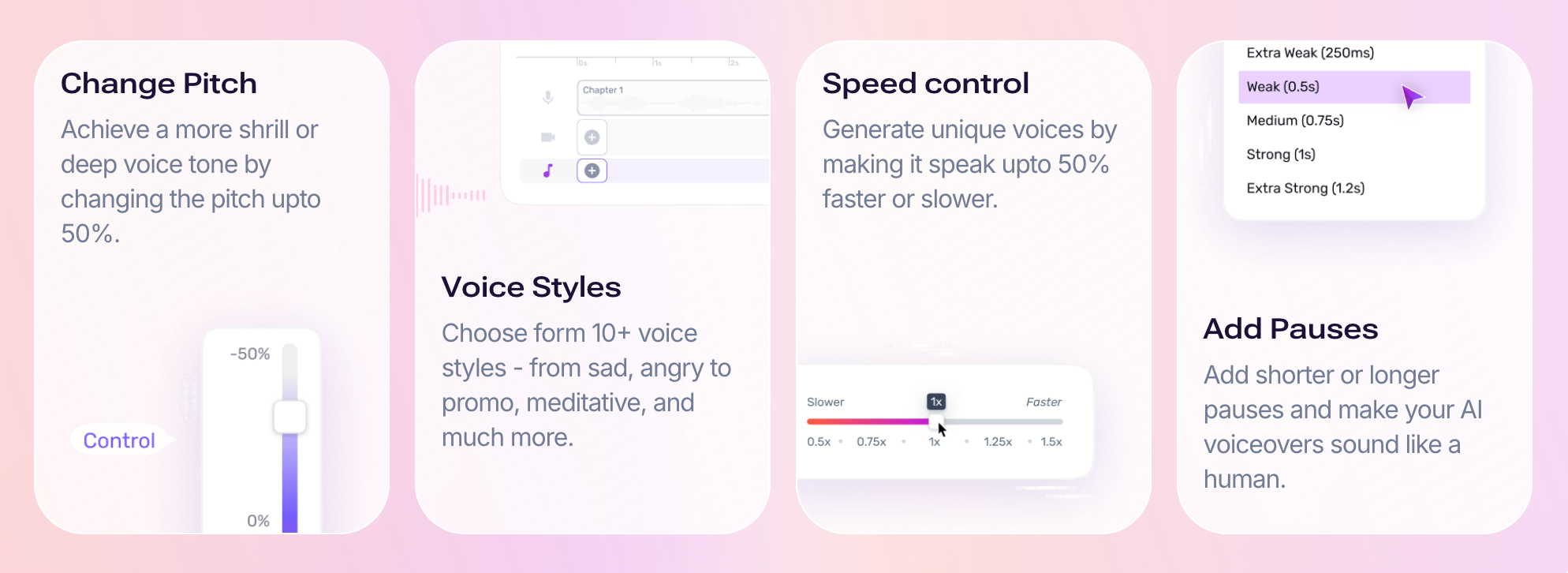Good Morning from San Francisco,
When Congress rejects your proposal 99 to 1, most people take the hint. Silicon Valley's solution?
Get the White House to try it anyway through executive order, complete with funding threats borrowed from a venture capital white paper.
Meanwhile, OpenAI launched a "faster" coding model yesterday that tells a different story once you look past the speed claims. The real innovation is compression, automatic context pruning that cuts token costs when you're burning cash on million-token sessions.
The pattern? Repackage rejection as strategy, frame cost optimization as breakthrough, and hope nobody notices you're solving problems you created.
Today we're examining what happens when necessity gets marketed as vision.
Stay curious,
Marcus Schuler
Trump's Executive Order Targets State AI Laws Congress Already Rejected 99-1

The White House is drafting an executive order to override state AI laws through federal litigation and funding threats, reviving a proposal the Senate rejected 99-1 in June 2025.
The draft, dated November 19, directs Attorney General Pam Bondi to establish an "AI Litigation Task Force" targeting California's SB 53 catastrophic risk reporting and Colorado's algorithmic discrimination protections.
Commerce Secretary Howard Lutnick would withhold portions of $42.5 billion in broadband funding from states with "onerous" AI regulations.
The constitutional problem is straightforward. Executive orders can't preempt state laws, that power belongs exclusively to Congress. Republican governors Ron DeSantis and Sarah Huckabee Sanders oppose the measure as a Big Tech bailout, defending state child safety protections and discrimination safeguards.
The draft borrows its dormant Commerce Clause argument directly from a September Andreessen Horowitz white paper.
Trump's Special Advisor for AI and Crypto, billionaire venture capitalist David Sacks, coordinates implementation across multiple agencies.
House Republicans are attempting to insert similar language into the year-end defense bill despite Marjorie Taylor Greene previously threatening to tank Trump's tax legislation over identical provisions.
Why This Matters:
• Silicon Valley investors securing federal override of state consumer protections face sustained backlash from Republican governors through 2026 midterms
• Trump administration testing executive power limits after congressional rejection sets precedent for conditioning unrelated federal grants on policy compliance

AI Image of the Day

Prompt:
In a minimalist and impressionistic style, a largesquare nose dominates the center of a piece of paper, sketched in bold pen strokes and shaded with delicate watercolors. Long, shaggy black and white fringes obscure the eyes, while a prominent square moustache adds character to the caricature. Warm hues of sepia and soft grays create a cozy, inviting atmosphere, capturing the essence of the man's face in a uniquely artistic manner.(736 x 1312)
Introducing Implicator PRO

Starting next week, we are introducing a weekly paid edition for readers who need deeper insight into the fast moving AI industry.
Every Tuesday at 6 AM PST, Implicator Pro will deliver a focused long form briefing that goes beyond the daily news cycle.
Each edition will examine one topic in depth, with strategic context, clear analysis of business implications, and a grounded view of what may come next. We are writing these briefings for founders, engineers, investors, policy makers, and anyone who needs to understand not just what is happening in AI, but why it matters.
The free daily newsletter stays exactly as it is. It will continue to land in your inbox every morning. Pro subscribers receive the weekly deep dive on top of all free content.
If you want to support this work and get deeper analysis each week, you can join here:
OpenAI's Codex-Max Optimizes for Survival, Not Dominance

OpenAI launched Codex-Max yesterday with 30% fewer tokens consumed and 27-42% faster execution, framing efficiency as technical progress while the numbers reveal cost optimization under financial pressure.
The model scored 77.9% on SWE-Bench Verified versus 73.7% for its predecessor, putting it roughly level with Anthropic's Claude Sonnet 4.5 at 77.2% and slightly ahead of Google's Gemini 3 at 76.2%, margins tight enough to suggest capability plateaus across frontier models.
What separates Codex-Max is compaction, an automatic compression system that works across multiple context windows by pruning history to preserve "important context," though OpenAI doesn't specify what determines importance or how much signal gets lost during 24-hour autonomous sessions that could compress multiple times.
This contrasts with Anthropic offering 200,000-500,000 native tokens and Google supporting up to 2 million, suggesting OpenAI chose workarounds over expansion.
The first Windows-trained Codex model signals Microsoft ecosystem alignment beyond technical accommodation, expanding addressable market to 49% of developers using Windows while tightening Azure integration. API access remains "coming soon" despite immediate ChatGPT availability, likely reflecting unfinalized pricing for million-token sessions that could spiral costs across thousands of programmatic users.
Why This Matters:
• Engineering teams adopting Codex-Max need baseline metrics on actual codebases before trusting 27-42% speed claims given compaction's unquantified information loss.
• OpenAI's competitive position increasingly depends on Microsoft partnership and cost structure rather than capability advantages as Anthropic and Google close benchmark gaps.

🧰 AI Toolbox
How to Create Professional AI Voiceovers in Minutes

Murf.ai transforms written text into ultra-realistic voiceovers using advanced AI technology. Choose from 200+ natural-sounding voices across 20+ languages and customize pitch, speed, and tone to match your project. Perfect for creating voiceovers for videos, podcasts, presentations, e-learning, and audiobooks without hiring voice actors.
Tutorial:
- Go to the Murf.ai website and create a free account
- Start a new project and paste or type your script into the editor
- Browse the voice library and select from 200+ AI voices in different languages, ages, and styles
- Customize your voiceover by adjusting pitch, speed, emphasis, and pauses for natural delivery
- Add background music or video files and sync them with your voiceover timeline
- Preview your audio and make edits until it sounds exactly how you want
- Download your professional-quality voiceover and use it commercially in your projects
URL: https://murf.ai/
Better prompting...
Today: Strategic Account Plan
Task: Create a comprehensive account plan for [customer name].
Required inputs:
- Company profile (industry, size, business model, key challenges)
- Known priorities and strategic initiatives
- Current product usage (adoption rate, feature utilization, pain points)
- Stakeholder map (decision-makers, champions, users, influencers)
- Renewal date and contract value
Analysis framework: First, synthesize the inputs to understand the customer's business context and how our product fits their strategy. Then identify:
- Health assessment: Evaluate the account's current state (green/yellow/red) based on product usage, engagement, and satisfaction signals
- Strategic goals (3 to 5): What outcomes should we drive in the next quarter/year? Link each goal to customer priorities and business value
- Risks (prioritized): What could threaten retention or expansion? Include probability and potential impact for each
- Opportunities: Where can we drive expansion, deeper adoption, or stronger relationships? Quantify potential value
- Action plan: Specific next steps with owners, timelines, and success metrics
Output format: Present as a structured document with clear sections. Make it actionable, not just descriptive. Each recommendation should answer "why this matters" and "what success looks like."
Tone: Strategic and insight-driven, written for an account executive or customer success manager.
The Dollar Episode: Inception Point Turns Podcasting Into Ad Arbitrage

Eight employees. Three thousand episodes per week. One dollar per episode. Inception Point AI runs an industrial operation treating audio like inventory, not art.
Its Quiet Please network carries 5,000 shows with 175,000 episodes flooding Spotify and Apple Podcasts. CEO Jeanine Wright describes a near future where "half the people on the planet will be AI." Her critics hear capital replacing microphones with models.
The unit economics rewrite podcasting. Cost: one dollar. Break even: twenty listens. Traditional podcasts need thousands of downloads to justify costs running hundreds or thousands per episode. Inception Point inverts this through programmatic advertising monetizing tiny audiences at scale. Wright admits quality control doesn't exist. The team reviews only "hard politics or hard news" before publishing. Everything else runs autonomously. Reviewing 3,000 weekly episodes would require more staff than the company employs.
The constraint isn't AI capabilities. It's platform tolerance. Spotify and Apple could implement AI labeling, volume limits, or discovery penalties tomorrow and crater the model. They haven't. Platforms profit from content volume regardless of source. The podcast advertising market projects $130 billion by 2030. Every show represents potential revenue, synthetic or human.
Why This Matters:
- Platforms must choose: implement human-synthetic distinctions or accept algorithms favoring high-volume feeds gaming coverage through pure quantity over quality
- Mid-tier podcasters spending $500 per episode can't compete with dollar episodes needing twenty listeners—survival requires direct audience relationships

AI & Tech News
GOP Split Emerges Over Trump AI Regulation Plan
Several prominent Republican officials including Senators Josh Hawley, Florida Governor Ron DeSantis, and Arkansas Governor Sarah Huckabee Sanders have publicly opposed President Trump's proposal to restrict individual states from regulating artificial intelligence. The presidential proposal, which emerged following lobbying efforts from Silicon Valley companies, has created a notable split within the Republican party over federal versus state authority on AI governance.
Nvidia posts $57 billion quarter, sold out through 2026
Nvidia beat Wall Street expectations with $57 billion in Q3 revenue and guided to $65 billion next quarter, driven by $51.2 billion in data center sales that climbed 66% year over year. The company holds $500 billion in chip orders spanning 2025 and 2026, with CEO Jensen Huang stating "cloud GPUs are sold out," a signal that hyperscaler spending, now topping $380 billion annually across Microsoft, Meta, Amazon, and Alphabet, continues absorbing production faster than Nvidia can ship.
Palo Alto Networks buys $3.35 billion observability play
Palo Alto Networks reported 93 cents adjusted EPS on $2.47 billion revenue, both beating estimates, then announced a $3.35 billion cash acquisition of Chronosphere, a cloud-native observability platform founded in 2019 that raised $369 million across four rounds. Shares dropped 2% despite the beat and $15.5 billion in remaining performance obligations climbing 24% year over year, a signal that investors view the observability consolidation as expensive integration risk even as CEO Nikesh Arora positions the company as "the data and security partner of choice in the AI era."
Tech Expert Predicts Major AI Platform Shift Coming in 2026
Technology analyst Benedict Evans has released his overview of major tech trends expected to shape 2026, centered around what he describes as "AI eating the world" through a fundamental platform shift. Evans highlights several critical factors including increased capital expenditure by major tech companies driven by AI FOMO (fear of missing out), Nvidia's continued dominance in the AI chip market, and emerging infrastructure bottlenecks particularly around US power grid capacity that could constrain AI development.
Commerce Secretary Lutnick's AI Advocacy Raises Ethics Questions
A New York Times investigation reveals that US Commerce Secretary Howard Lutnick has been actively promoting artificial intelligence initiatives and pressuring US allies to support AI projects while his companies and sons financially benefit from these same ventures. The report raises potential conflict of interest concerns as Lutnick uses his official position to advance data center projects that generate profits for his family businesses.
US Department of Energy Partners with Tech Giants to Accelerate AI Supercomputing at National Labs
The US Department of Energy is expediting its efforts to equip national laboratories with AI supercomputers through new partnerships with major technology companies including Nvidia, AMD, and Oracle, with these private companies contributing to funding costs. The initiative reflects the growing urgency around artificial intelligence capabilities at national research facilities that have long been centers for cutting-edge scientific advancement.
Verizon Announces Largest-Ever Layoffs Affecting 13,000+ Employees
Verizon CEO Dan Schulman has initiated the company's largest-ever round of layoffs, with more than 13,000 employees set to be impacted according to an internal memo. The new CEO stated that the telecommunications giant must reorient its strategy around "delighting" customers as the company begins notifying affected workers of the workforce reduction.
Cornell Study Reveals xAI's Grokipedia Cites Extremist Websites Hundreds of Times
Cornell University researchers have conducted the first comprehensive analysis of Elon Musk's Grokipedia project, revealing that the AI-powered encyclopedia cites extremist websites extensively, including 107 references to white nationalist site VDare, 42 citations of neo-Nazi website Stormfront, and 34 references to conspiracy theory platform Infowars. The study represents the most thorough examination of Grokipedia's source material since Musk launched the Wikipedia alternative through his xAI company last month.
Conservative YouTube Podcasters Drive Political Advertising Surge
A Bloomberg analysis of YouTube's top conservative podcasters reveals a significant boom in host-read advertisements specifically targeting right-wing audiences, with political ads appearing in nearly 91% of the 876 episodes examined. The study highlights how conservative podcast hosts are actively promoting products and services that appeal to MAGA supporters, including items like Republican Red Winery vintages, demonstrating the growing commercialization of political content on the platform.
Pornhub Parent Company Pushes Tech Giants for Device-Based Age Verification
Aylo, the parent company of Pornhub, has sent formal letters to major technology companies Apple, Google, and Microsoft requesting they implement device-based age verification systems across their operating systems and app stores. The company is proposing this alternative approach as a solution to prevent minors from accessing adult content while addressing ongoing regulatory pressures around age verification for pornographic websites.
AI Chatbots Fail to Recognize Mental Health Conditions in New Study
A new study by Common Sense Media and Stanford University found that major AI chatbots including ChatGPT, Claude, Gemini, and Meta AI frequently failed to recognize signs of mental health conditions when users sought help. The research revealed "systematic failures" in how these chatbots identify psychiatric conditions, with the AI systems typically offering only general advice rather than appropriate mental health guidance.
Meta AI chief LeCun exits for sensory intelligence startup
Yann LeCun told Meta employees he's leaving at year-end to launch a company focused on Advanced Machine Intelligence, AI trained on visual and sensory data rather than text, with Meta retaining partnership rights and access to innovations. LeCun, at Meta since 2013, struggled to secure resources as the company prioritized language models to compete with OpenAI and Google, clashed internally over his public criticism of LLM strategies, and was kept out of company spotlights after Llama 4 flopped, a pattern where fundamental research loses to commercial urgency and the lab's most prominent voice becomes a liability.
Matter 1.5 to Introduce Camera Interoperability for Smart Home Devices
The Connectivity Standards Alliance (CSA) announced that Matter 1.5 will support video cameras for the first time, potentially allowing smart home cameras from different manufacturers to work together across platforms. However, major tech companies Amazon and Google have not yet committed to making their camera products interoperable with the new Matter standard, raising questions about widespread adoption of the cross-platform compatibility feature.
Uber Launches Robot Delivery Service in Europe Through Starship Partnership
Uber Technologies Inc. is expanding into autonomous delivery services in Europe through a partnership with Starship Technologies, launching sidewalk robot deliveries in the UK cities of Leeds and Sheffield starting in December. This marks Uber's first venture into robotic delivery services in Europe, utilizing Starship's autonomous six-wheeled robots that travel on sidewalks to deliver food and other items directly to customers.
Spanish Court Orders Meta to Pay €479M Fine to Digital Media Companies
A Spanish court has ordered Meta to pay €479 million ($552 million) to 87 Spanish digital media outlets for engaging in unfair competition practices and violating European Union data protection regulations. The substantial fine represents a significant legal setback for the social media giant as it faces increasing regulatory scrutiny across Europe over its business practices and handling of user data.
🚀 AI Profiles: The Companies Defining Tomorrow

Doppel hunts digital doppelgängers. The company uses AI agents to find fake CEOs, cloned customer service reps, and deepfake voices before they drain your bank account.
The Founders
Kevin Tian and Rahul Madduluri founded Doppel in 2022 after watching fraud evolve at Uber. They met there in 2016 as data engineers and saw every flavor of impersonation attack. Now they run a San Francisco company with roughly 180 employees fighting what they call "social engineering at scale." The thesis? Generative AI turned rare targeted scams into mass produced nightmares.
The Product
Doppel Vision crawls domains, social platforms, messaging apps, paid ads and parts of the dark web for fakes. It connects fake domains, rogue LinkedIn profiles and deepfake calls into one threat graph. Brand Protection kills lookalike sites. Executive Protection hunts fake C-suite accounts. The standout is Simulation. It uses the same AI that powers fraud to train your team against it, running "vibe phishing" with cloned voices and adaptive conversations. Speed matters here. Doppel automates takedowns that once needed lawyers and analysts for each case.
The Competition
Bolster, ZeroFox and Netcraft all monitor for phishing and fake domains. KnowBe4 dominates security awareness training. Doppel's edge? It ties detection to training in one loop and covers more channels than email focused tools. Legacy players grew up protecting inboxes. Doppel designed for multi-channel attacks involving calls, texts and social apps.
Financing
Bessemer led a $70M Series C in November 2025, pushing valuation past $600M. Total raised hits $124M. Investors include Andreessen Horowitz, CrowdStrike CEO George Kurtz, and a crew of WNBA stars. ARR tripled year over year. Fortune 500 customers quintupled.
The Future ⭐⭐⭐⭐
If scammers keep weaponizing AI, Doppel wins. The company entered early, landed blue chip backers and built real traction. Risk? Crowded market, established competitors with bigger sales teams. The irony stings: Doppel uses deepfakes to train people against deepfakes. Success might mean nobody outside security teams ever hears the name. 🎭











